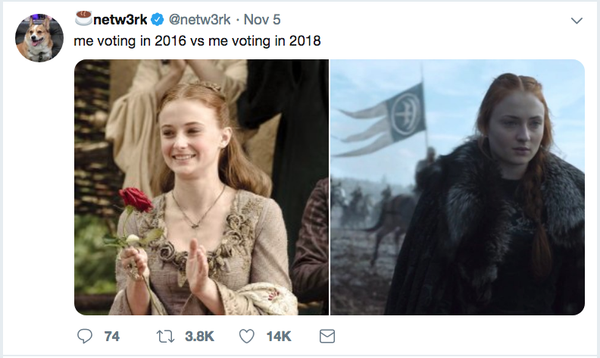Content Warning: descriptions of physical and emotional abuse and mention of rape in a historical fiction novel called "Their Eyes Were Watching God"
Our society is and has been comprised of a lot of complex structures and systematic oppression that unfortunately cannot be fixed in a day. Implicit bias runs rampant, even with the most unbiased people. Oppression is tough to beat, and we still haven't fully accomplished it.
October is Relationship Violence Awareness Month. Relationship violence has tons of issues with oppression, many of which we may not even realize. Relationship violence stems from many areas, some of which are more well-known than others. For example, violence is cyclical. It can be caused by people searching for control. It can be caused by narcissism. In my English 129 class this semester, I learned about this additional cause that leads to relationship violence: oppression.
The first book we read in this class was a semi-autobiographical novel called "Their Eyes Were Watching God" by Zora Neale Hurston. (Fun fact: Carolina Hall will hopefully be soon changed to Hurston Hall!) The book portrayed what life looked like for a black woman in the early to mid-1900s. I wrote on this topic for my paper, which was 11 pages, so here's a shortened version:
Janie, the main character, is a black woman who, over the course of the story, has three different husbands, all of which are black as well. These men are oppressed and disrespected, unable to live as freely, to say the least. Because of the way they're treated, they feel small. They feel unimportant. They feel out of control and powerless. So what do they do? They fight for it. In all of the wrong ways.
Jody, Janie's second husband, is definitely one of the main perpetrating husbands. He both physically and emotionally abuses Janie through hitting her, manipulating her, and controlling her. He tells her what to wear. He gaslights her into thinking that she should appreciate the way he's dominating her; he's saying she's wrong to feel the way she feels. When she stands up for herself, he fights her into submissiveness. Gaslighting and other behaviors such as these are avenues of abuse.
As stated before, he acts these ways because he feels oppressed as a black man. The reader can see this through his other actions as well: he becomes mayor of a town in which black people are trying to find success. When Janie is asked to speak, he takes over for her.
Later on, Jody dies and Janie marries a man named Tea Cake. At first, he seems promising — they go on spontaneous dates, he brings excitement to her life. However, not long after, he shows his true colors. He causes her to suffer then grins as if nothing has happened — which is a form of gaslighting. He whips her solely because he feels scared. When he hits her, he pampers her after in a way that ignites jealousy in those around them. This cyclical nature of his behavior as well as the way he hides the abuse from others are also classic signs of relationship violence.
What makes all of this worse is the fact that relationship violence can also lead to oppression. For example, Janie's caretaker, Nanny, was raped by her slaveholder. Through her life, she realizes how much men can hurt women and how important it is that Janie marries a man who will protect her and not hurt her. So when Nanny sees Janie kissing a boy named Johnny Taylor as a teenager, she tells her she has to marry a man named Logan Killicks instead. Janie protests, and Nanny slaps her, hard. Nanny, out of fear and out of knowing violence so well, engages in violent behavior as a result. The violence that the two of them endure causes them to feel oppressed because they feel they can't speak up about what happened to them. Janie has been hurt and is limited in what she's "allowed" to do as a wife of Jody and Tea Cake. When Janie is married to Jody, she's not allowed to engage in "porch talk," for example, which embodied something many people enjoyed at the time.
Through these examples, we can see that people who feel powerless try to take it back in other ways: when they feel hurt, they hurt. When they feel oppressed, they oppress. When they feel as if they cannot speak up, they put others in a place where they feel they can't speak up.
Unfortunately, these situations are still present today, many years later. People of minority groups feel they can't speak up out of fear they'll worsen stereotypes about their group. Black women may not want to report against black men because they don't want to further the incorrect stereotype that "all black men are violent." People in the LGBTQIA+ community may not want to talk about the abuse at the hands of their partner in that community because they don't want to further the incorrect stereotype that people who are LGBTQIA+ are "gross" or "sick" or simply "bad."
Further, the need people feel in which they must desperately search for control is common to most if not all people. Feeling out of control is scary. Enduring violence is scary. Feeling powerless can lower self-worth. And while this is definitely not the case for all, sometimes hurt people hurt people.
Relationship violence is incredibly prevalent. Something I didn't notice was the number of women murdered by their male partners is almost twice the amount of soldiers U.S. troops in Afghanistan from 2001 to 2012. And that only accounts for the categorically "most severe" (I put in parentheses because we shouldn't rank violence and all kinds of violence are incredibly valid) examples of relationship violence. Further, 1 in 4 women and 1 in 7 men will endure partner violence in their lifetimes. Again, this only accounts for physical abuse -- it doesn't include emotional abuse, financial abuse, sexual abuse, or the many other variations.
What's important to know during this time is that relationship violence can be prevented and survivors can be supported. This information should be dispersed all year — not only during RVAM. Some important resources include the Love is Respect organization, the Carolina Women's Center for those at the University of North Carolina at Chapel Hill, and the National Domestic Violence Hotline.
When we serve as allies to ourselves and our loved ones, we have to keep in mind that relationship violence exists outside romantic relationships as well as inside them. I find saying Relationship Violence Awareness Month is so much more important than Domestic Violence Awareness month because RVAM embodies relationship violence at the hands of parent-child relationships, friendships, family relationships, and so many more. In addition, women can be perpetrators in addition to men. I will discuss this further in another article for my RVAM series this month, so stay tuned!
In addition to understanding the different relationships in which violence can occur, we need to be able to recognize the signs and ways to support loved ones who are struggling when they aren't able to access those above resources yet. If you go to UNC-Chapel Hill, consider taking a HAVEN training, in which you'll learn how labeling others' experiences isn't helpful, how empathy is crucial, as well as other important resources and information that you may not have heard or realized before.
As stated previously, it's vital to be empathetic rather than sympathetic by putting yourself in the shoes of the person you're talking to. Don't blame them for what happened to them. Don't pressure them to make any decisions they aren't comfortable with; remember, they deserve autonomy as well, and are currently being stripped of it.
If you're interested in helping the issue on a less direct level, share the above resources on your social media pages. Speak up when people discuss stigma and stereotypes pertaining to relationship violence. Volunteer with and attend events of organizations like the Carolina Women's Center and Compass Center when they put on RVAM events. Check out the RVAM calendar that the UNC-Chapel Hill safe.unc.edu website provides.
A multitude of ways to fight oppression also exist. For example, acknowledge your privilege. If you're a woman, acknowledge the fact you're more likely to be believed about your experience with sexual violence. If your a man, acknowledge the fact that you can walk home at night without fear. If you're not a minority, acknowledge the fact that you're less likely to be affected by violence generally speaking.
We can also fight oppression by listening to what people who are oppressed need, respecting their experiences, and supporting them however we can.
These two options aren't all that hard to do, yet they have such a big impact on public health and safety. What ways can you support other people today?



















